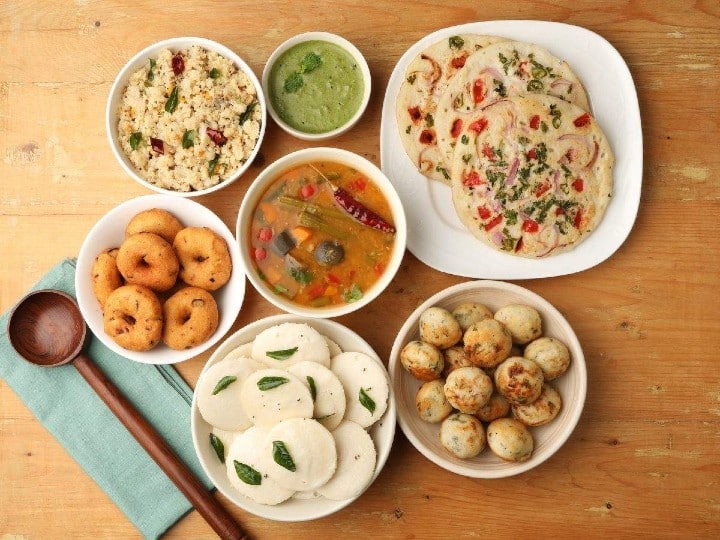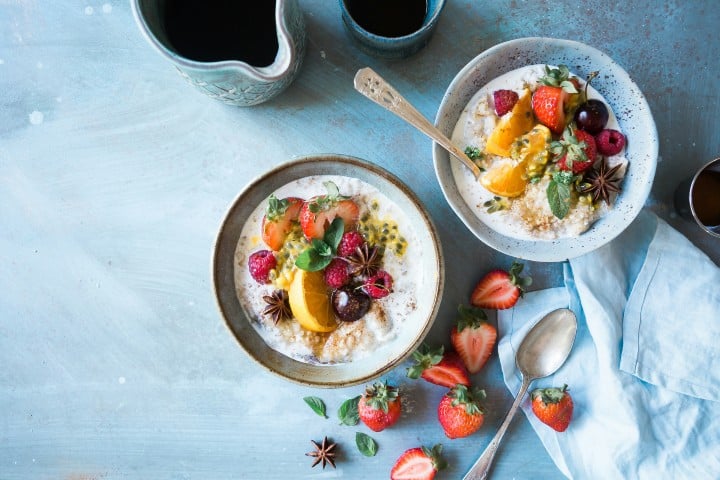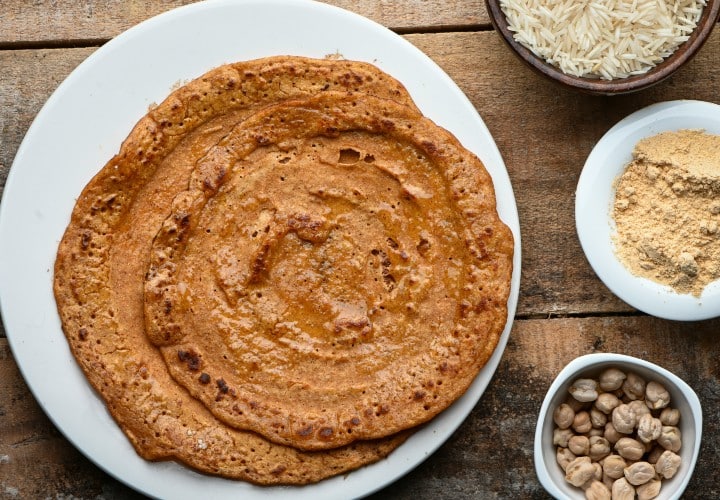Breakfast is often referred to as the most important meal of the day, and this rings especially true for individuals managing diabetes. A healthy breakfast sets the tone for the day, providing the necessary fuel, nutrients, and blood sugar control to help manage diabetes effectively. For diabetics, making smart breakfast choices is crucial for maintaining stable blood sugar levels, managing weight, and promoting overall well-being.

Typical Indian Breakfast
Table of Contents
What’s Wrong With the Current Breakfast Scenario?
Come to think of it, our typical breakfast is loaded with carbohydrates. If you remember, carbs spike glucose levels and keep it elevated. Be it Idli, Dosa, Poha, Pongal, Upma, Vada or Paratha – all these are heavy on carbs with barely any proteins to offset the spikes or provide nutritional value. This is also the reason why for diabetics such type of a carbohydrate rich breakfast is least beneficial. Making small changes like lowering the carbs ratio and adding in more nutrient dense food go a long way in keep the sugar levels in check.
Let’s understand how and why.
Understanding the Role of Diet in Diabetes Management [2]
A well-planned Low carbohydrate diet plays a significant role in preventing and managing diabetes along with promoting overall health. For individuals with diabetes, understanding the impact of diet on blood glucose levels and insulin resistance is crucial. A diabetes-friendly Low carbohydrate (Low Carb) or Ketogenic (Keto) diet focuses on controlling blood sugar levels, reducing the risk of extended complications, controlling lipids and reach a healthy weight.
The Low Carb diet focuses of nutrient dense foods that reduce insulin and glucose spikes along with providing the body with all the required nutrients [3]. Low Carb meals typically include vegetables, greens, lots of proteins and healthy amounts of natural fats. The combination of these foods aids in slowing down the absorption of sugars into the bloodstream, preventing blood sugar spikes.
You can read more on the Indian way of Low Carbohydrate nutrition here.
The Importance of Low-Carb Breakfast Choices
Carbohydrates are the primary nutrient that significantly influences blood sugar levels. When consumed, carbohydrates are broken down into glucose, causing blood sugar levels to rise. For individuals with diabetes, particularly those aiming to control their blood sugar, limiting carbohydrate intake, especially refined carbohydrates and sugars, is crucial.
Low-carb breakfast choices can help prevent rapid spikes in blood sugar levels and promote more stable glycemic control throughout the day. By opting for foods that are lower in carbohydrates and higher in fiber, healthy fats, and protein, you can support better blood sugar management and reduce the risk of complications associated with diabetes.
Incorporating High-Protein Foods for Blood Sugar Control [4]
In addition to focusing on low-carb options, incorporating high-protein foods into your breakfast is equally essential for managing diabetes. Protein-rich foods have minimal impact on blood sugar levels compared to carbohydrates and can help promote satiety, reduce appetite, and support muscle health.
Including protein in your breakfast can also help regulate blood sugar levels by slowing down the absorption of carbohydrates and preventing post-meal spikes. Moreover, protein is essential for muscle repair and maintenance, especially for individuals with diabetes who may be at risk of muscle loss due to insulin resistance or other factors.
Eggs and Diabetes: A Nutritional Overview
Eggs are a great choice for people with diabetes [1]. They’re packed with good stuff that your body needs to stay healthy. Here’s why eggs are so good for you:

Eggs – Ideal breakfast Choice
Protein Powerhouse: Eggs are full of high-quality protein, which helps keep your blood sugar steady. This means you won’t get those big spikes in blood sugar after eating.
Feel Fuller, Longer: Eating protein-rich foods like eggs can help you feel full for longer, which can stop you from snacking on unhealthy foods. This is important for managing your weight, especially if you have diabetes.
Heart Healthy: Eggs have nutrients like choline, omega-3 fatty acids, and antioxidants that are good for your heart. They can help lower your risk of heart disease.
No Need to Worry About Cholesterol: In the past, people thought eggs were bad because they have cholesterol. But now, research shows that the cholesterol in eggs doesn’t have much of an effect on your blood cholesterol levels. So, you can enjoy eggs without worry.
You can enjoy eggs in lots of different ways for breakfast. Try making omelets, scrambled eggs, or boiled eggs. Pair them with veggies or lean proteins for a balanced meal that keeps your blood sugar in check and your heart healthy. It’s a tasty and nutritious way to start your day, especially if you have diabetes.
The Health Benefits of Greek Yogurt
Greek yogurt and berries are a great breakfast choice for people with diabetes. They’re not only yummy but also packed with good stuff for your body. If you cannot find Greek Yoghurt, you can simply use Hung Curd. Here’s why they’re so good for you:
- Protein Power: Greek yogurt is full of protein, which helps control your blood sugar and keeps you feeling full longer.
- Berry Bonanza: Berries like blueberries, strawberries, and raspberries are bursting with good things like antioxidants, vitamins, and fiber. They’re super healthy for you.
- Happy Gut: Greek yogurt has probiotics that are like little helpers for your gut. They keep your tummy happy and can even boost your immune system.
- Insulin Friend: Especially blueberries can help your body use insulin better, which is important for people with diabetes.
- Low Sugar, High Nutrition: When you mix Greek yogurt with fresh berries, you get a breakfast that’s low in sugar but high in all the good things your body needs. It’s perfect for keeping your blood sugar in check.
To add Greek yogurt and berries to your breakfast, simply grab a bowl of Greek yogurt and top it with some fresh berries. If you want, you can sprinkle on some ground flaxseed for extra fiber, and add a little sugar-free sweetener for sweetness. This tasty combo gives you protein, fiber, and antioxidants, all in one delicious bowl. It’s a great way to start your day, especially if you have diabetes.
Delicious Low Carb Breakfast Options
Here are some simple breakfast ideas that are low in carbs and high in protein:
- Egg and Veggie Scramble: Cook eggs with colourful veggies like peppers, spinach, onions, and mushrooms. Add some spices for flavour.
- Chia Seed Pudding: Mix chia seeds with unsweetened coconut or almond milk and let it sit in the fridge overnight. Top with berries, nuts, and a bit of sweetener like Stevia drops.
Chia Seeds Pudding
- Moong Dal Chilla (Lentil Pancakes): These savoury pancakes made from ground moong dal are rich in protein and fibre, making them an excellent low-carb option for individuals with diabetes. Customize with spices and vegetables for added flavour and nutrients.
Moong Dal Cheela
- Paneer Bhurji: Paneer, or Indian cottage cheese, is a protein powerhouse that can be sautéed with onions, tomatoes, and spices to create a flavourful and low-carb breakfast option. Pair with a side of green vegetables for added nutrition.
- Egg Bhurji: Indian-style scrambled eggs, or egg bhurji, can be prepared with onions, tomatoes, green chilies, and spices for a delicious and protein-packed breakfast. Serve with a side of fresh salad or grain-free roti/cheela for a balanced meal.
- Cottage Cheese, Fruit, and Nut Bowl: Indulge in a satisfying breakfast bowl by pairing cottage cheese (also known as paneer/chena) with low sugar fruits and nuts for a protein-rich kickstart. Fuel your day with a nutritious blend of cottage cheese, fruit, and nuts, perfect for diabetics seeking sustained energy. This protein-packed combination offers a delicious and wholesome option to begin your day on the right note, supporting your health goals
- Greek Yogurt Parfait: Layer Greek yogurt with nuts, seeds, and berries. Sprinkle with cinnamon for extra flavour.
- Avocado and Smoked Salmon Wrap: Spread mashed avocado on a low carb tortilla or lentil crepe or lettuce leaves. Add smoked salmon, cucumber, and arugula. Roll up and enjoy.
- Coconut Flour Pancakes: Make pancakes using coconut flour, eggs, and coconut milk. Serve with berries and Greek yogurt or coconut cream.
Coconut Flour pancakes
- Omelette with Avocado and Salsa: Fill an omelette with avocado, salsa, and cheese. Serve with greens or veggies.
- Smoothie Bowl: Blend spinach, kale, avocado, protein powder, and almond milk. Top with nuts, seeds, and coconut flakes.
- Cottage Cheese and Fruit Plate: Serve cottage cheese with sliced fruit like berries and kiwi. Add cinnamon or honey for extra taste.
- Egg Muffins: Whisk eggs with veggies, cheese, and herbs. Bake in muffin tins for a quick and tasty breakfast.
- Sausage Frittata: A Hearty, Low Carb Option: Sausage frittata offers a hearty and low-carb breakfast choice for individuals managing diabetes. This flavorful option aids in blood sugar control due to its low carbohydrate content. The combination of sausage and eggs provides satiating protein, keeping you full longer. Enhance the nutritional value by adding vegetables like bell peppers or spinach. Complement your frittata with fresh fruit or whole grain toast for a well-balanced meal
Common Questions About Breakfast for Diabetics
1. Is it safe for a person with diabetes to eat eggs every day?
Enjoying eggs daily can be beneficial for diabetics. Rich in protein and low in carbs, they make a healthy breakfast choice. The high protein and fats also ensure that the sugar levels remain steady while keeping you feeling full for several hours. Monitoring blood sugar levels is key when incorporating eggs into your diet. For personalized advice, consult with a healthcare provider or a low carb nutritionist.
2. What should a person with diabetes eat first thing in the morning?
A well planned meal sets the tone for the day. While it is not necessary to eat something as soon as you wake up, if you are a in the habit of an early breakfast, you can benefit for several low carb meal choices are mentioned in this article above. If you are taking medications, please reach out to a low carb nutritionist to help you with the meal planning.
3. Are there any foods that should be avoided for breakfast by diabetics?
Avoid sugary cereals, pastries, and fruit juices that can lead to sudden spikes in blood sugar levels. Ideally foods that are high in sugar and carbs – typically grains like rice, wheat, oats, millets, etc. need to be avoided as they promote insulin resistance and keep sugar levels elevated.
4. Why Breakfast is Important for People with Type 2 Diabetes?
Instead of breakfast, let’s call it the 1st meal of the day. Planning the 1st meal of the day is crucial as it aids in stabilizing blood sugar levels post-overnight fasting, boosts energy and focus, prevents overeating later, and influences overall health decisions.
Conclusion
In conclusion, managing diabetes starts with making smart breakfast choices. Understanding the impact of your morning meal on blood sugar levels is crucial for diabetic wellness. Opt for nutrient-packed options like eggs, Greek yogurt, and chia seed pudding to kickstart your day right. Prioritizing proteins, adding healthy fats and keeping carbohydrates low is key in crafting a diabetic-friendly breakfast. Choose wisely, savour flavour, and enjoy a diverse and delicious breakfast that fuels your body while keeping your health in check. Your well-being matters, so nourish yourself with care and knowledge.
For a personal consultation, schedule a free 30-min discovery call.


